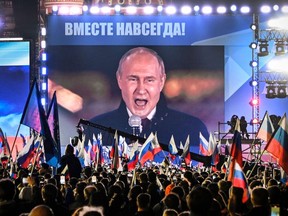Russia's absurd annexation has already become a liability for Moscow
Get the latest from Adam Zivo straight to your inbox

ODESA, Ukraine — Last week, Vladimir Putin self-proclaimed the annexation of four Russian-occupied Ukrainian provinces — Donetsk, Luhansk, Zaporizhzhia and Kherson — totalling about 15 per cent of Ukraine’s land. The annexation was laughably illegitimate but will provide Putin with useful domestic propaganda, which is what matters to his regime in the end. However, the Russian president may come to regret this decision as it will make Moscow’s faltering war effort more humiliating, leading to further domestic instability.
In September, Putin announced that annexation referendums would be held in occupied Ukraine — but it was obvious that these were sham referendums staged to provide a patina of legitimacy to Russian expansionism.
The NP Comment newsletter from columnist Colby Cosh and NP Comment editors tackles the important topics with boldness, verve and wit. Get NP Platformed delivered to your inbox weekdays by 4 p.m. ET.
Referendum participants reported being forced to “vote” at gunpoint by armed “election officials” who could see exactly which boxes were being ticked off on ballots. Human Rights Watch reported that local Ukrainians were fearful that voting against annexation would lead to reprisals, such as having one’s house demolished.
This isn’t the first time Russia has used voter intimidation to fabricate a “correct” referendum result. In 2014, Russian-backed separatists staged independence referendums in eastern Ukraine, which were used as a pretext to establish two pro-Russia breakaway republics, Donetsk and Luhansk, which are now being subsumed into Russia proper. Polish journalist Pawel Pieniazek corroborated international allegations of widespread voter intimidation and fraud, recounting them in detail in his book, Greetings from Novorossiya.
When the referendums showed overwhelming support to join Russia, Putin annexed the entirety of the four Ukrainian provinces. Three of these provinces are only partially occupied by Russia, so that meant laying claim to large areas not under Russian control. He then argued that attacks on these regions constitute an attack on Russian soil, possibly justifying nuclear retaliation.
The EU and NATO condemned Russia’s annexation, as have other major powers such as Japan and Turkey, but the United Nations Security Council failed to follow suit as Russia vetoed an anti-annexation resolution. Notably, China and India abstained from voting on that resolution, remaining strategically neutral on the war — though not ideal, ongoing neutrality is an acceptable compromise as Russia will crumble without powerful allies.
Most of the international community’s opinions are irrelevant to Putin, who most of all needs to ensure that he has domestic support for his war. Armed with nuclear weapons, the greatest threat to his power is a revolution or coup — which is why it matters that Russians are increasingly unhappy with how the war is being managed.
In September, Ukraine launched a stunning counterattack which liberated almost all of the Kharkiv region. In Russia, this chastened nationalists and unleashed unprecedented criticism of the government. Moscow subsequently announced that it would mobilize 300,000 reservists, which only caused further protests and riots and an exodus of over 200,000 Russian men from the country.
Annexation seemed like a way to reconsolidate support, boost morale and claim some kind of victory. To that end, Putin resorted to increasingly unhinged rhetoric during his annexation speech on Friday.
In that speech, Putin used the sham referendums to argue that he was simply defending citizens’ inalienable right to self-determination, as enshrined in the UN charter — because gunpoint voting is self-determination, apparently.
He then accused Kyiv of intimidating millions of referendum participants with violence and death, a claim which there is no evidence for and which doesn’t make sense anyways. Kyiv has little influence in lands occupied by foreign soldiers, and survivors of occupation routinely testify to Russians using wanton harassment and torture to impose near-total control over society.
Putin positioned Russia as an “anti-colonial” leader resisting the hegemony of a “Satanic” and “despotic” west — an ironic claim for a leader who is, at this very moment, colonizing lands where he is overwhelmingly despised. He then said the west is “racist” towards Russia — another bizarre statement designed to make Russians paranoid and defensive while absolving them of moral responsibility for the war.
And yet, rather than boost morale and reconsolidate support, Putin’s annexation speech, with all its bluster and pomp, appears to have already become a liability.
The day after the speech, Ukraine managed to encircle and capture Lyman, a strategic town in Donetsk, showing that annexation is no shield against the Ukrainian advance. Ukrainian officials claim that Putin delayed evacuating the town in order to avoid an embarrassing snafu just before the annexation announcement — allegedly, this cost Russia 1,500 soldiers.
-

Adam Zivo: Russia's fleeing draft dodgers are a security threat to Europe
-

Adam Zivo: Canada should expel Russian ambassador after he lied about Izyum mass grave
Ukrainian forces also appear to have broken through Russian lines in the southwest, in the Kherson region, where Moscow deployed its strongest forces in August. This shows that Ukraine can prevail against Russian soldiers at their mightiest, rather than only breaking through weakly-defended lines as happened in the Kharkiv counteroffensive.
These losses would’ve been hard for Putin to bear in any case, but they must be particularly humiliating now, as he will be forced to concede the loss of territories which, just days ago, he claimed would forever be part of Russia.
But will counter-offensives in annexed territory convince Putin to use tactical nuclear weapons? Maybe. With Putin, anything is possible — especially since his speech ominously referred to Hiroshima and Nagasaki as “precedents.”
However, optimism is warranted. Ukraine has before launched attacks into territories that Russia believes it owns — including strikes on air bases in Russian-occupied Crimea — suggesting that Moscow’s new red line is only imaginary.
National Post
Get the latest from Adam Zivo straight to your inbox


